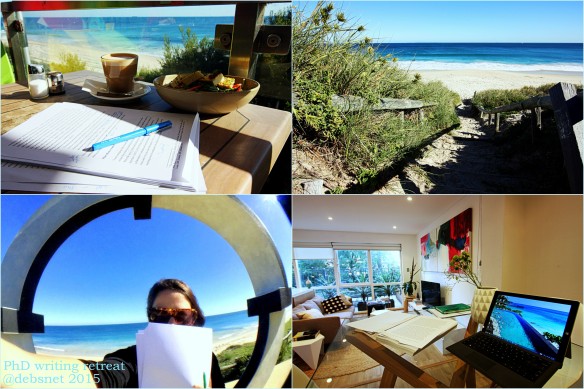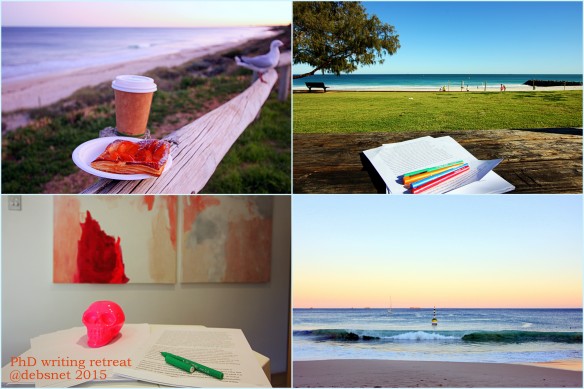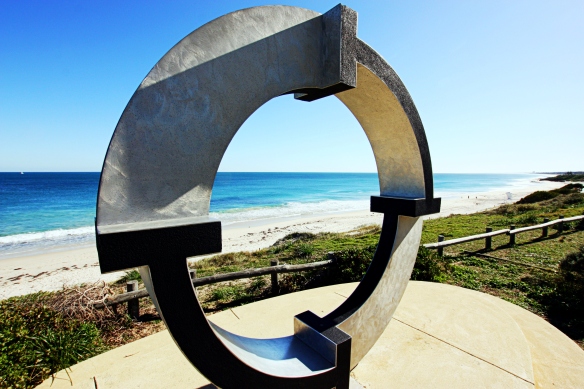Writing is an escape from a world that crowds me. I like being alone in a room. It’s almost a form of meditation. ~ Neil Simon
The idea for a PhD writing retreat came to me in a dream. While I live in Australia, I dreamt that I wrote up my PhD thesis in Paris. I imagined myself pensively working at Café de Flore or Les Deux Magots in Saint-Germain-des-Prés. Or editing on a soft patch of grass at the foot of a sculpture in the gardens of Musée Rodin (Le Penseur?). Or typing away beneath the huge train station clock at the Musée d’Orsay. I would take breaks to stroll Parisian streets or to savour Ladurée macarons, foie gras from Fauchon, or ice-cream from Berthillon on the Île Saint-Louis.
This dream was no doubt influenced by the at-that-time steady stream of tweets coming from the ANU Thesis Boot Camp during which doctoral writers were given celebratory LEGO-style bricks as they hit various word-count milestones. The academic focus and collaboration zoomed through social media to my device. Oooh, I thought, how wonderful it would be to have some dedicated time to work on my thesis. But with work and two children under five, a long luxuriant Parisian getaway wasn’t on my list. And my university doesn’t offer a boot camp.
Writing retreats have been called a ‘scholastic nirvana’ away from the walls-closing-in pressures of academia. Dr Helen Kara, blogging about her recent solo writing retreat, talks about the simultaneous self-indulgence and productivity that finding dedicated time and space for writing can bring. In Dr Kylie Budge’s post about her PhD writing retreat to NYC, she cites research which claims that physical and psychological distance from the norm can increase creativity and productivity.
Casey, Barron and Gordon (2013) note that writing retreats provide protected space for the practice of writing, allowing continuity as opposed to fragmentation. They emphasise the importance of carving out time away from normal activity, and finding space separate from usual settings. This certainly resonated with me, as much of my writing happens in fragmented, stolen, in-between moments.
While many boot camps, ‘shut up and write’ sessions and writing retreats are about producing words, this was to be more a revision retreat. Having recently finished the first draft of my conclusion, I had a first full draft of my thesis and wanted to use retreat time to look at my thesis as a whole document. In fact, my thesis is over its word limit, so this retreat was about streamlining and strengthening the content, not producing more. I’d reached a point where I needed to burrow down into my PhD cave’s subterranean depths and sit there for a while. Present. Focused. Submerged.
Like Helen and Kylie, this retreat would be solo: just me and my thesis having some quality time together. Romantic, right? When I floated the idea with my husband, he said, ‘Go for it.’
A bit of an expert at making my PhD feel like a holiday, I often choose writing spaces that feel more like luxe and less like work. So, for my retreat, I considered exotic, non-home places with varying degrees of faraway-ness. I was aware of the aforementioned research about productivity and creativity being heightened by the feeling of being away from home and somewhere new. But I didn’t need exoticism, or a vibrant distracting location. I was going for a weekend, so it needed to be close and affordable, just not home. In the end, I rented a studio apartment via airbnb only a few suburbs from home. I was hoping that being not-home would give me enough separation from my everyday world to provide the laser-like focus and conceptual creativity I was after.
While not as poetic as retreating to somewhere far from home, there were some great things about doing a retreat this way. In giving myself only two nights away, I had to be productive. I had a short time; I needed to use it. I didn’t waste time travelling to and from the retreat (it was a 20 minute drive); this was an escape in my own city. It turned out to feel just new enough to set my nerve filaments tingling with an awareness of difference of environment.
Going into the writing retreat I planned on using my most productive times of the day for writing, working in 2-3 hour blocks of time followed by breaks (walking, showering, eating, changing location, taking some photos). I wanted to be clear about my intention before I began. My main purpose was revising for coherence and story. Here was time to look at the document as a whole. I kept in mind Pat Thomson’s advice to attend to the underlying argument. I was looking for consistency of language and idea development across the thesis. Having just finished the Conclusion, it was important to go back to the Introduction and make these bookends work together.
During my retreat the first 30-40 pages took me the longest, because there was so much of what Pat in her post calls ‘where the writing is poor because we are struggling to express an idea, to put into words something that we can barely get our head around.’ The beginning of the document contained my earliest writing and earliest thinking. I needed to delete or rewrite much of it in a way I can only do now that I have reached the end.
What surprised me about the retreat was how challenging it was to maintain a consistent focus on one task. It made me realise how much my usual fragmented way of PhDing works for me, doing a little all the time in prized, highly-focused chunks. Fitting in PhD time in and around other commitments has meant that normally I am itching to get to my PhD work, not having to psych myself into doing it.
Yet, the time and space to dedicate a couple of days to my thesis, and giving it careful, continuous attention, allowed me to make substantial progress and identify those areas in need of further attention. While in this time I only got through the Introduction and Literature Review, these were the sections in need of the most serious revision (and they will need more). I also managed to cut 3000 words out of those two chapters, which, considering I was also adding words where required, is a good start to streamlining my argument.
The retreat embodied my 3 words for 2015: presence (in the moment), sharing (through writing and now blogging), and strength (of argument and academic voice). It helped to set up my approach to my thesis revision, kickstarting this push-to-the-end-process and propelling me forward into the rest of the document. It felt a bit like kicking off the swimming pool wall, getting some initial speed and feeling the water before settling into the lap ahead.








Pingback: Writing retreat: Dedicated time away to write and revise | Newbie Researcher
You show profound strength in how you focus to write and write with focus. How do you generate the strength to both write and write about writing? Thank you for this post!
beautiful photos , as always
LikeLiked by 1 person
Thank you, Cynthia! I think writing about writing helps me with the writing. It’s a kind of meta-writing which allows me to think carefully about what I’m doing before I revisit it. My favourite bit was taking the photos!
LikeLiked by 1 person
I am not sure I am able to leave a comment… but LOVED The piece! Hope your theses is now as thorough and collected as your weekend notes!
LikeLiked by 1 person
Pingback: Choose your own Edventure: Letting genius blossom | the édu flâneuse
Pingback: For wellbeing & productivity: breathe. pause. be. | the édu flâneuse
Pingback: Revising writing: Lessons from the PhD thesis | the édu flâneuse
Reblogged this on Caroline+Kühn and commented:
Just such a lovely and doable idea, humble but down to earth. Accepting the limitation one has but not renouncing to the essence of the experience which is going away from the every day environment to get to do what you need to move forward in your PhD. I hope to be so wise when I am so far 🙂
LikeLike
Just to tell you how sensible you are and how really committed to your work. Acknowledging your limitations but not getting away from the idea to have a writing retreat. Hurrahh!! for you! Love your work 🙂
LikeLike
Thanks so much, Caroline. I appreciate it. I find I need to add some pleasure into the PhD to keep me going!
LikeLiked by 2 people
That’s the secret of lifr! Adding pleasures to it so we can move forwadd with joy ! The funny thing is thag no one will do it for us and that is what I celebrate from you!! Have a productive and joyful week : )
LikeLiked by 1 person
Pingback: Is your PhD a love affair or a war story? | the édu flâneuse
What a wonderful idea, I have thought about doing the same for a while. I love that you have actually done it, and doing it in the weekends is a good way to start I think. Being a part of a busy work place (in an open office), it can sometimes be hard to focus, and I crave silence. I dream about going to Paris as well 🙂 But I think I will start by finding a place closer to home as a start. Thank you for inspiration! 🙂
LikeLike
My pleasure! I hope you find your own protected space for your writing and work.
Deb
LikeLike
Pingback: Professional editing for the PhD thesis? | the édu flâneuse
Pingback: The neverending story of the PhD | the édu flâneuse
Pingback: How to make your PhD seem like a holiday | the édu flâneuse
Pingback: 5 things I learned in 2015 | the édu flâneuse
Hi, yes this piece of writing is in fact pleasant and I have learned lot of things from
it about blogging. thanks.
LikeLike
Pingback: The oasis of writing | the édu flâneuse
Pingback: Flashback Friday: The end of the PhD | the édu flâneuse